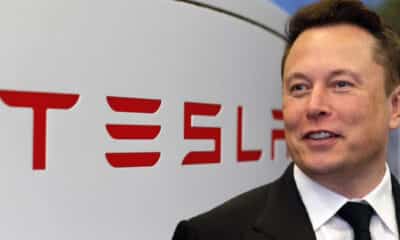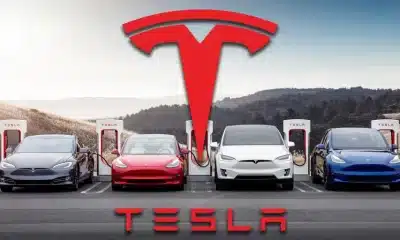Finance
Tesla Shareholders Overrule Judge and Approve Musks $56 Billion Pay Package

Tesla shareholders approved CEO Elon Musk’s $56 billion pay package on Thursday, giving him a giant thumbs up and an incentive to stay focused on his primary source of income.
The approval shows Musk’s popularity among Tesla’s retail investors, many of whom are vociferous supporters of the erratic tycoon. Despite resistance from huge institutional investors and proxy firms, the proposal passed.
Musk portrayed himself as pathologically optimistic while speaking onstage at the annual shareholder meeting in Austin, Texas. “If I wasn’t optimistic, this factory wouldn’t exist,” Musk added, to applause. “But I do provide at the end. That is the crucial thing.”
He had hinted late on Wednesday that the plans were gaining widespread support.
The decision does not, however, resolve a challenge over the pay package in Delaware, which some legal experts believe might last months. In January, the judge nullified the salary package, calling it “unfathomable.”
Musk may possibly face more lawsuits over the gift, which would be the largest in US company history. Shareholders approved this package in 2018.
“This thing is not over,” said Brian Quinn, a professor at Boston College Law School. The Delaware judge will examine the vote and demand Tesla to demonstrate that Musk did not pressure or unduly influence the process, he added.
Judge criticised Tesla’s board
The judge criticised Tesla’s board as “beholden” to him, claiming that the plan was suggested by a biassed board with tight personal and financial links to its CEO.
On Thursday, shareholders accepted a plan to transfer the company’s legal headquarters from Delaware to Texas. They also supported other suggestions, including the re-election of two board members: Musk’s brother Kimbal Musk and James Murdoch, the son of media magnate Rupert Murdoch.
Despite board opposition, shareholders increased investor power by adopting plans to shorten board terms to one year and reduce voting requirements to a simple majority.
Tesla did not announce the voting results on Thursday, but they are anticipated to be released in the coming days. At least half a million people watched the meeting live on social media platform X, with another 40,000 watching on YouTube.
“First and foremost, this statement conveys that Tesla’s retail shareholders approve of what is going on. “It will be interesting to see the exact percentages of votes,” said Lindsey Stewart, a director at Morningstar Sustainalytics.
Shareholder acceptance of the compensation acts as both an affirmation of Musk’s term and an acknowledgement that investors do not want to jeopardise the company’s future.
“They are brushing aside essentially key man risks, where Tesla has become even more dependent on Musk going forward,” said Jason Schloetzer, a business professor at Georgetown University who specialises in corporate governance.
Musk’s focus has shifted
Musk vowed to develop AI and robotics products outside of Tesla in January if he fails to win sufficient voting power. He moved the company’s focus to robotaxis, abandoning cheaper mass-market electric vehicles, to the dismay of some investors who worried the autonomous technology would be difficult to master.
In an update on Tesla’s performance, Musk claimed on Thursday that the business just shipped a record 1,300 Cybertrucks in a week and that plans for volume production of Semi trucks were in place. He spoke extensively about plans for self-driving cars, but he provided no time period for their launch.
Tesla’s stock price has declined by nearly 55% since its 2021 top, as EV sales have slowed and Musk’s focus has shifted between Tesla and other businesses he owns. The stock closed up 2.9% on Thursday.
“Shareholders once again endorsed the terms of the contract, sending a strong signal that ‘a deal is a deal’ and Musk deserves to be rewarded for meeting the lofty thresholds of an entirely incentive-based contract,” said Garrett Nelson, an analyst with CFRA Research.
“The news lifts a major overhang on the shares, although we wouldn’t be surprised by a “sell the news” reaction on Friday following big gains over the past two trading sessions as the likely outcome became clearer.”
The board determined that Musk deserved the package since he met all of the lofty benchmarks for market value, revenue, and profitability. Large investors, including the California Public Employees’ Retirement System, had labelled the pay package “excessive.”
“Elon Musk and Chair (Robyn) Denholm have made this about CEO loyalty and presented the votes as a decision on whether the company can keep Musk,” said Ivan Frishberg, Amalgamated Bank’s chief sustainability officer.
“That is a lot of pressure but it doesn’t change the fact that good governance is good for the bottom line of a company, and the Tesla board is consistently and clearly deficient on that front.”
While Musk is unquestionably Tesla’s driving force and is responsible for most of the company’s success, sales and profits have stalled. There are concerns that he is stretching himself too thin.
Source: Reuters









































